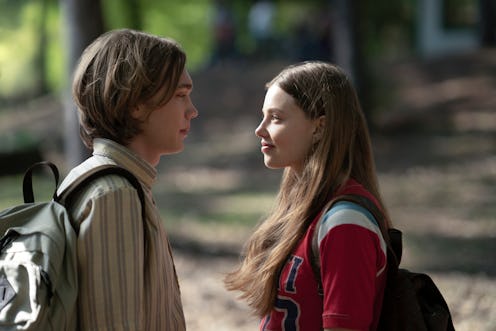Books
Don't Read The 'Looking For Alaska' Ending Without A Box Of Tissues

If you're a John Green fan embarking on your first read-through of his debut novel, you might be wondering about the end of Looking for Alaska. The novel features the kind of tearjerker moments for which Green — who also penned The Fault in Our Stars and Paper Towns — would later become known, but the ending might leave you scratching your head a bit. Major spoilers ahead.
First published in 2005, Looking for Alaska centers on Miles "Pudge" Halter, a prep-school newcomer who has a special interest in famous last words. At Culver Creek Preparatory High School, Miles' roommate, Chip "The Colonel" Martin, nicknames him "Pudge" and brings him into a new circle of friends, which includes aspiring rap star Takumi Hikohito and the beautiful, but fragile, Alaska Young. Pudge, The Colonel, Takumi, and Alaska delight in breaking Culver Creek's rules by drinking, smoking, staying out after hours, and pulling pranks on the school's more popular students.
As you read through Looking for Alaska, you'll notice that the early chapter headings — "one hundred thirty-six days before," "sixty-seven days before," etc. — count down to some kind of event. As that event draws close, it becomes clear that, whatever it is, it's going to hurt when it happens. Pudge, Alaska, and their friends are drinking more heavily, and Alaska seems to be withdrawing from something or someone.
"Two days before" it happens, Alaska reveals to the group that, when she was eight years old, she found her late mother dying of an aneurysm, went into shock, and never called for help. A drunken Alaska tells Pudge on "the last day" that she blames herself for the loss of her mother. In spite of the fact that Alaska has a boyfriend and Pudge has a girlfriend, the two of them indulge in an intoxicated make out session — until Alaska receives a call. She returns, crying, and leaves again, this time driving away in her car.
The next morning, the Culver Creek student body learns that Alaska has died in an auto accident. While driving drunk on the highway leading to her mother's gravesite, Alaska crashed into a police vehicle at full speed and was killed on impact. Pudge blames himself for her death, believing that he should have done more to stop her from leaving.
In the wake of Alaska's death, the novel shifts to chapter headings indicating how many days "after" the crash their events take place. One question remains for Pudge, The Colonel, and Takumi — Did Alaska kill herself, or was her death an unfortunate accident? As they wrestle with the fact that they may never know what happened to their friend, the boys discover that Alaska's accident occurred just after midnight on the day after the eighth anniversary of her mother's death.
Theorizing that Alaska must have been racing to the cemetery to visit her mother, her friends try to move on with their lives. Takumi departs unexpectedly for Japan, but leaves a note behind, confessing that he, not Pudge, was the last person to see Alaska alive. She was distraught at having missed the anniversary of her mother's death, Takumi says, because she always put new flowers on her grave each year. Much the same as Pudge, Takumi blames himself for not stopping Alaska from driving that night.
Takumi's note puts the final piece of Alaska's puzzle into place for Pudge, who now knows what Alaska's last words were, and realizes that he has to let go of his friend. Ever the free spirit, Alaska wouldn't want anyone to think that they could control her in the way that Pudge and Takumi wish they had that night. Pudge reasons that Alaska forgives him for letting her leave on the night of her death, and admits that he forgives her for leaving him behind. The novel closes with Pudge ruminating: "Thomas Edison's last words were: 'It's very beautiful over there.' I don't know where there is, but I believe it's somewhere, and I hope it's beautiful."
This article was originally published on